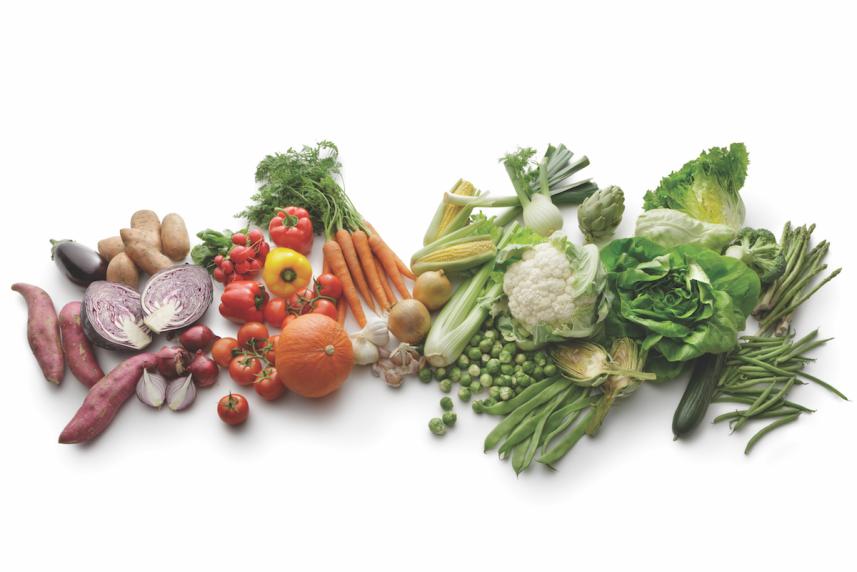The grocer is in
One prescription for relieving, and even preventing, certain conditions? Vitamin-rich foods from your local supermarket.

“Food and nutrition play a magnificent role in maintaining health, particularly as we age,” says Jennifer McDaniel, M.S., R.D.N., owner of McDaniel Nutrition in St. Louis. For patients with chronic health conditions, McDaniel almost always recommends Mediterranean eating.
“Elevated, chronic inflammation is the root of many inflammatory-related diseases, such as heart disease, diabetes, and Alzheimer’s,” she explains. “Heart-healthy fats, whole grains, and lots of fruits and veggies may ease symptoms.” The good news? Preparing Mediterranean meals that help alleviate, or prevent, certain conditions—whether it’s hypertension, Alzheimer’s, chronic obstructive pulmonary disease (COPD), or diabetes is more manageable (and affordable!) than you might think. Let’s take a look.
Hypertension: Pack in Potassium
Potassium is a supernutrient for hypertension, says McDaniel. She notes that potassium helps lower blood pressure by balancing out the negative effects of sodium and easing tension in blood vessel walls.
Aim for 4,700 mg of potassium per day with these powerhouses:
- 1 baked sweet potato (694 mg)
- 1 baked potato (610 mg)
- ½ cup canned white beans (595 mg)
- 8 oz plain nonfat yogurt (579 mg)
- ½ cup tomato puree (549 mg)
- ¾ cup carrot or prune juice (517 to 530 mg)
- 3 oz cooked halibut (490 mg)
- ½ cup cooked spinach (419 mg)
Sodium: Managing salt intake plays a key role in maintaining proper health, too. For those with hypertension, McDaniel recommends keeping sodium to less than 700 to 800 mg per meal, or 2,300 mg per day.
Alzheimer's: Load Up on Leafy Greens
Following a Mediterranean approach to eating can reduce the risk of developing Alzheimer’s by 53 percent and improve long- and short-term memory.
- Dark leafy green veggies and berries,* along with other anti-inflammatory foods, enhance the brain in different ways, says McDaniel.
- Olive oil cleans out amyloid B proteins (the “cobwebs” of the brain) that clog up thinking. Foods rich in nitrates (arugula) increase blood flow to the brain and the heart.
- Fish rich in DHA (salmon, tuna, trout) have been shown to help with memory
*Always check with your doctor before beginning a new type of eating plan.
Power your brain with these superfoods:
- Berries: 1 to 1½ cups per day
- Leafy greens: 2 to 2½ cups per day
- Other veggies: 1 to 1½ cups per day
- Olive oil: ½ tablespoon per day
- Whole grains: 6 oz per day
- Nuts: 1½ oz every other day
- Beans: 1 cup 3 times per week
- Fish: 12 oz per week
- Red meat: Less than 12 oz per week
COPD: Keep Calcium and Vitamin C High
Pulmonary lung function can be improved with vitamin C, so eat plenty of fruits and vegetables. Aim for 90 mg per day for men, and 75 mg per day for women. Here are some top sources:
- ½ cup red bell pepper
- ½ cup strawberries
- 1 cup cooked brussels sprouts
Calcium: Some medications for COPD can cause bone density loss, so it’s important to consume nutrients that keep your frame strong. Aim for 1,000 to 1,200 mg of calcium per day and 600 to 800 international units of vitamin D per day. The best sources of vitamin D are fatty fish and UV-enhanced mushrooms—those that have been exposed to sunlight. Get your calcium from dark leafy greens, dairy, and calcium-fortified foods like these:
- ½ cup part-skim ricotta (308 mg)
- 1 cup cooked collard greens (357 mg)
- 4 oz tofu (397 mg)
- 1 cup calcium-fortified orange juice (348 mg)
- 2 oz sardines with bones (217 mg)
- 1 cup soy milk or almond milk (200 mg)
Fats: Healthy fats, including olive oil, avocados, and nuts, can increase the amount of oxygen those with COPD take in, says McDaniel. Added fat can also promote a healthy weight, as many with COPD are underweight. Talk to your doctor before upping your fat intake.
Diabetes: Fill Up on Fiber
“People with diabetes benefit from eating the right type of carbs,” says McDaniel, noting that carbs should account for roughly 55 percent of your daily consumption. She recommends consuming at least 25 grams of fiber per day for women, and 30 grams per day for men. Get your fill with these fibrous foods:
- ½ cup beans (5.5 g)
- ½ cup whole grains such as oats (4 g)
- 1 cup quinoa (3 g)
- Fruits and vegetables
Magnesium: Added magnesium is also helpful in managing diabetes, says McDaniel. The recommended daily allowance of magnesium for those 31 and up is 320 mg for women and 420 mg for men. Check out these magnesium-rich food sources:
- ½ cup almonds (192 mg)
- ½ cup whole-wheat pasta (116 mg)
- 1 cup black beans (91 mg)
- 1 oz pumpkin seeds (74 mg)


